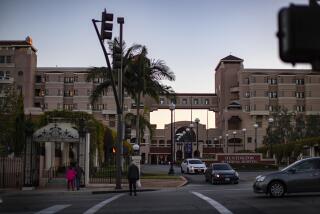Doctor Accused of Aiding Large Narcotics Ring
A Los Angeles doctor was arrested Monday in connection with a large narcotics ring that allegedly obtained thousands of fraudulent prescriptions for one of the most powerful and addictive drugs on the market.
State and federal authorities, who have been investigating the case for almost two years, charge that Dr. Beverly Lewis, 46, participated in an enormous operation to illegally sell Dilaudid, a potent painkiller known as drugstore heroin.
Dilaudid, which is used to treat cancer patients and others in severe pain, normally sells at pharmacies for 75 cents per tablet. But on the streets of Los Angeles and elsewhere, it is especially popular among heroin addicts, who are willing to pay $35 to $50 a pill.
“This was a large professional operation,” said Special Agent Dale Ferranto, who heads the state Bureau of Narcotic Enforcement office in Los Angeles. “Once these kinds of schemes are rolling, they can make a substantial amount of money and distribute a large number of drugs.”
Under state and federal law, Dilaudid is among the most tightly regulated pharmaceuticals in the nation. When a prescription is issued, doctors must send a special form to state regulators who monitor the sales of potentially addictive medications.
In addition to the pending criminal probe, investigators said that Lewis is facing possible disciplinary action by the state Medical Board for prescribing drugs without medical justification. Depending on the charges, the doctor could lose her license.
Lewis and her alleged accomplices, Delores Jackson, 55, of West Covina and Marilyn Brown, 43, of Moreno Valley, appeared Monday in federal court, where they face 16 felony charges of conspiracy, possession with intent to distribute Dilaudid, and aiding and abetting.
District Judge Stephen V. Wilson set Lewis’ bail at $25,000 and ordered her to return to court on Jan. 13 for arraignment. Jackson, who was denied bail, and Brown, who is being held in lieu of $100,000 bail, pleaded not guilty to the charges.
Wilson scheduled their trial for Feb. 25. If convicted, the defendants could face a maximum sentence of 20 years in prison. All three were indicted by a federal grand jury on Friday.
Assistant U.S. Atty. David Garcia, the prosecutor, said the investigation is continuing and that more indictments are expected against members of the alleged scheme, including three other doctors.
Donald Marks, the attorney for Jackson, could not be reached for comment Monday. Brown’s attorney, W. Philip Higgins said, “We intend to get all the discovery and proceed with our defense.”
Lewis’ attorney, Morton Boren, declined to discuss the case.
According to federal court records, the scheme operated from 1993 through November 1996 when search warrants were served at the offices and homes of more than 10 doctors in Riverside and Los Angeles counties.
The indictment alleges that Lewis, whose practice was on Wilshire Boulevard, wrote prescriptions to Brown and Jackson using more than two dozen fictitious names and addresses. Each prescription contained 100 tablets. In exchange, Jackson and Brown paid Lewis $3,000 to $4,000 a month for her cooperation, court records state.
Once the prescriptions were filled at local pharmacies, Jackson and Brown made arrangements for the Dilaudid to be sold in Southern California as well as other states, including Tennessee, Louisiana, Texas, and Kentucky.
The indictment focuses on 15 prescriptions for 100 tablets each that were issued by Lewis between May 10, 1994, and Oct. 2, 1996. But court records indicate that the charges dramatically understate the size of the alleged diversion scheme.
Search warrant affidavits on file in federal court show that Lewis and three other physicians, who are still under investigation, were among the top four prescribers of Dilaudid in Los Angeles County between 1995 and 1996.
According to state prescription documents, all four wrote about 8,100 Dilaudid prescriptions for more than 800,000 doses from 1993 to 1996. Court documents further indicate that the four doctors issued illegal prescriptions to at least 10 individuals with long criminal histories for drug trafficking.
More to Read
Sign up for Essential California
The most important California stories and recommendations in your inbox every morning.
You may occasionally receive promotional content from the Los Angeles Times.











